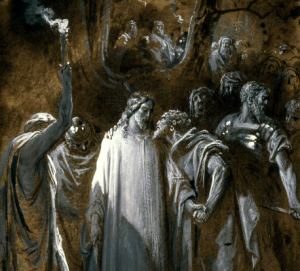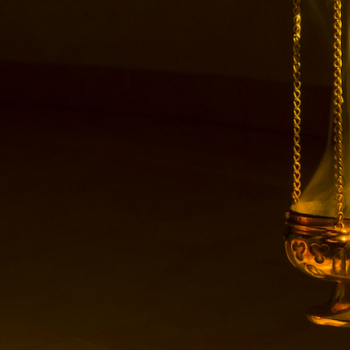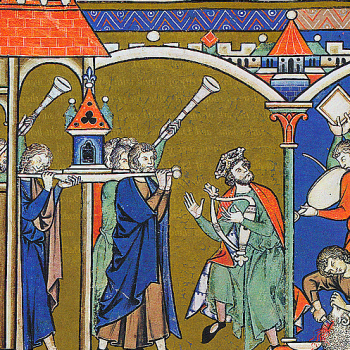This continues my discussion of Pride celebrations from last week.
Ye Have Heard That It Was Said
To review, the objection to Pride celebrations we had next to consider ran along these lines:
What about all the sexual immorality? You make such a virtue of accepting Catholic teaching about homosexuality—which is the least you should be doing, and you’ve admitted many times to not actually observing this teaching. Can’t you at least admit that the “identity” Pride festivals celebrate is rooted in sexual sin? And that people gather at them precisely to indulge in sexual sin and in public impenitence for it?
Stripped of its verbiage, the underlying syllogism appears to be something like this.
Premise 1. To celebrate something is implicitly to celebrate what it is rooted in.
Premise 2. Queer identity is rooted in sexual sin.
Premise 3. Pride celebrates queer identity.
Conclusion. Therefore, all Pride festivals implicitly celebrate sexual sin (even if any do not do so explicitly).

Ora pro nobis.
What part of this, pray tell, do I propose to deny? Only the first two premises and the conclusion, I promise; I’ll happily grant the third premise.
A Vote of Thanks to Judas
The first premise there is a strange and quite serious error for any Christian to make. Yet many do, and, from my experience discussing and writing about LGBTQ issues, Catholics seem almost addicted to making it. This honestly alarms me a little, because it suggests that something has either replaced the Catholic scheme of values in their minds—or, less worryingly, that they have never really digested it in the first place. I can’t be sure which (and in a way it’s not really my business). For now I’ll simply examine the error.
In substance, Premise 1 is a form of the post hoc fallacy1: the idea that bad things have bad results, and good things have good results. This may sound like a reasonable rule of thumb; in some contexts, maybe: theology, morals, and politics are not among those contexts. “The ends do not justify the means” is an important rebuttal. T. S. Eliot put a more eloquent one in the mouth of St. Thomas à Becket. As the knights are battering on the door of the cathedral to come in and kill him, he demands that the doors be opened, because he is about to say Vespers and the evening prayer of the Church must be open to all unconditionally.
PRIEST
aaaaaYou would bar the door
Against the lion, the leopard, the wolf or the boar,
Why not more
Against beasts with the souls of damned men, against men
Who would damn themselves to beasts. My Lord! My Lord!
THOMAS
You think me reckless, desperate and mad.
You argue by results, as this world does,
To settle if an act be good or bad.
—Murder in the Cathedral, Act II
Now, this may not seem like a big deal. Catholics forget the finer points of abstract theology all the time. But really, this is not one of the finer points. It is a basic assumption of the gospel. The whole idea of redemption and forgiveness, the most elementary understanding of the cross itself, requires good to be planted in the soil of evil: logically speaking, forgiveness could not exist, if there were no sins to forgive.2 To kiss the crucifix is to give thanks to Judas.

Study for The Kiss of Judas by Gustave Doré, 1865
The implications here are inscribed in both the liturgy and the New Testament. I will therefore glory in my weaknesses—oh, you’d better not if you’re a contemporary Catholic, St. Paul; that would GIVE SCANDAL, by implying that the strength we naturally desire is bad, wouldn’t it? (It wouldn’t.) O happy sin, O necessary fault that gained for us so great a Redeemer—and the surest signs of redemption are to care fervently about what others think of us and the people we associate with, and to in turn police the vocabulary, behavior, and decisions of our neighbor. (God, I gather, is busy.)
This is by far the more important of the two errors, as it has implications for the entire Christian schema. However, the other error is by far the more loudly and insistently repeated. Which brings us to Premise 2, Queer identity is rooted in sexual sin.
Sed Contra
My rebuttal runs as follows: No it’s not.
I mean, what else am I even supposed to say to a person being so confidently and entirely incorrect?
To generalize: LGBTQ terminology describes people whose bodies and/or erotic3 interests vary from the majority of people. Most people exhibit the characteristics of only one sex (endosex); most people’s sex aligns with their sense of self (cisgender); most people feel erotic interest (allosexual), and feel it only for people of the opposite sex (heterosexual). When used as an umbrella term, queer just means “at least one of those four ‘mosts’ doesn’t apply,” and the only thing the other words for queer identities do is get more specific about which ones don’t apply and how. They are not descriptions of behavior; for that, we use, you know, words and phrases that describe behavior, like “sexually active.” Nor are these words philosophical positions, still less political ones. They’re just how some people are, not in some esoteric way but in terms of daily life; it is not “ideology” to have words for that.
Nevertheless, Catholics have been asserting for years that queer identities are sinful and do not exist.4 They base this on an idea of queerness that is defined strictly by behavior, resolutely ignoring anything else LGBTQ terminology could mean, as well as how those words are used and defined by queer-identifying people. Many Catholics also propose the corollaries that (i) we should not use LGBTQ language, and (ii) anyone who does use it may be presumed to live in impenitent sexual sin5—sometimes accompanied by (iii) the very cute assertion that using this language is “against Catholic teaching.” All of these assumptions are unwarranted, intrusive, and rude, and there’s no amount of repeating false claims about what other people’s words mean that will make them anything else. Indeed, while (i) here is merely obnoxious, (ii) and (iii) actually cross into out-and-out slander, insofar as they implicitly accuse people of unchastity and heresy based on deliberately misinterpreted “evidence” that is, in truth, irrelevant.

The Audacity
But these people have already rejected the truth about sex, and Catholics have special access to the truth; that’s what the Church is for. Their sexual morality doesn’t even accept that sex should be reserved for marriage, or that—
Okay, first of all, my ass is one of “these people,” and I am a Catholic. A lot of Catholics are queer. You can’t invalidate my baptism based on that—not can’t as in “have no right to,” but as in “it’s absolutely beyond your power to”—and the same goes for anyone who’s been baptized.
Secondly, I do agree that Catholicism is the Truth-with-a-capital-T, in a way that no other school of thought in the world is. But being a Catholic does not entitle you to inform other people of what they mean—especially not the words they choose to describe themselves. If you tell someone you’re a Catholic Christian, and they reply “No, Catholics aren’t Christians,” do you not find that rude? Do you see how the same principle applies here? Doing these things implies such a gross lack of respect for the autonomy and intelligence of the person you’re speaking to, it’s little better than a slap in the face!
The same “don’t say ‘gay'” argument, consistently applied, should in theory make us object to words like straight and heterosexual, and to assume that anyone who describes themselves in those words is claiming to have an active sex life. Yet, in the twenty-ish years I’ve spent reading and writing about this stuff, the list of Christians I’ve come across who really do that begins and ends with Marc Barnes, author of the (apparently defunct) blog Bad Catholic. And why? Because that’s not what anybody means by “straight” or “heterosexual.” Those words, just like LGBTQ terminology, are talking about a disposition—what we might call an orientation, if it wouldn’t bring on its own avalanche of bad-faith objections.
It’s almost incredible to me that we are still having this (very boring!) conversation. When I first got to college, some time in the late 1940s, I was surprised we were having it at all, since it was so transparently stupid to pretend that queer people meant what Christians were saying they meant. I thought that laying it out logically and clearly would resolve the issue, except for maybe a few stubborn people.

Photo of me, taken ca. 1948
As usual, I underestimated the numbers of stubborn people relative to the numbers of those who would accept the standard definition of normal words.
Of course, where it gets breathtakingly insulting is when straight Catholics talk about how we “make everything about our sexuality.” Despite the fact that this stuff has a big impact on how we live, we can’t mention it in passing without being lectured, by you, on our vocabulary if not our very existence—and you have the gall to say we’re the ones making a big deal about this? Do you own a mirror?
Still, I did say there was a kernel of truth at the heart of the standard Catholic critique of Pride, didn’t I? No, I didn’t. What I did say was that not everything about that critique is irrational or unfair, so, yes, we’ll be having a Part III—after Pride month ends.
Footnotes
1The name comes from the Latin phrase post hoc ergo propter hoc, “after this therefore because of this.” The statistician’s weary maxim Correlation does not equal causation is related.
2This doesn’t mean we could not have a good world without evil. Indeed, we could still have a world full of undeserved grace (since grace, i.e. a creaturely share in the life of the Trinity, is something no being but God can deserve, ontologically). But we could not have the specific good thing we call “forgiveness,” except on the condition that evil be first permitted by God, and then made actual by some creature or creatures.
3I mean erotic here as a category covering both “romantic” and “sexual.” Not every person experiences both, and the relationship between them can be complex; however, and especially since I’m so prone to digressions, I wanted a word that would suggest both meanings without taking the discussion elsewhere. Erotic definitely isn’t a perfect term for that purpose, as it does give more weight to the sexual than the romantic, but I couldn’t think of a more satisfactory alternative—hence the footnote.
4Why yes, this does sound like a contradiction in terms. To be quite fair, it doesn’t logically have to be: pretending something exists when it doesn’t can be a form of lying. (For example, while it’s real enough as a vague cultural category, pretending that the racial idea of “whiteness” is metaphysically real is quite wrong and silly, and is the false basis on which most racism is built.) However, Catholics themselves don’t show a consistent line on the meaning of the word identity: at one moment they’ll say the only identities that exist are “human being” and “male versus female,” but at another they’ll be deeply concerned with “Catholic identity,” or discuss various national and ethnic identities without expressing any reservations.
5I don’t know of evidence that either of these issues were commonplace concerns in Catholic circles before the ’80s. This may only represent a gap in my own researches, of course. Still, on analogy with certain other aspects of American Catholicism (like its strange predilection for young-earth creationism), it makes me wonder whether this is another “perennial teaching of the Church” that we somehow only picked up from Protestants in the last thirty years.













